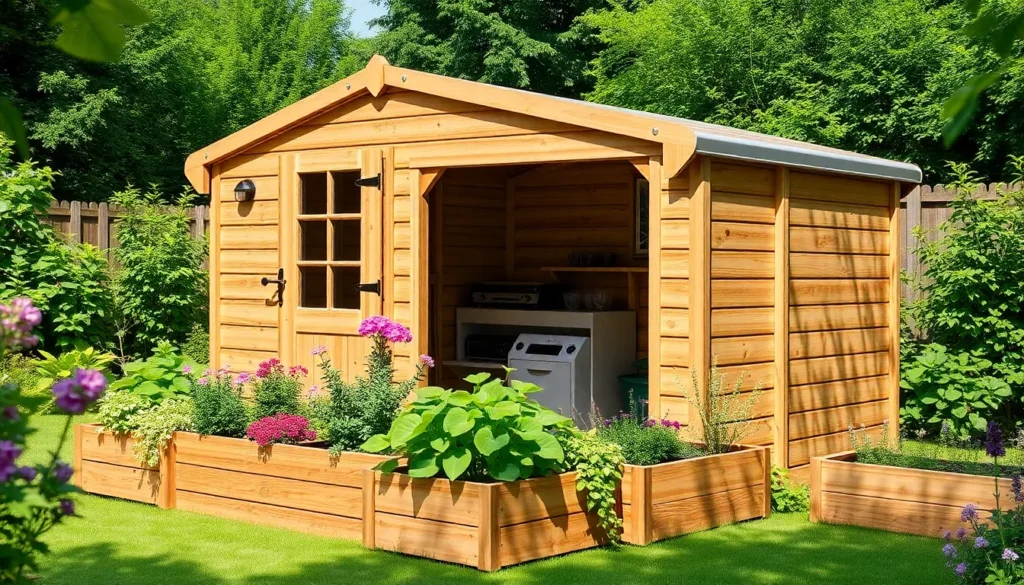Imagine a world where your morning coffee doesn’t come with a side of guilt. Sustainable living isn’t just a trendy buzzword; it’s a lifestyle choice that allows people to enjoy life while being kind to the planet. It’s about making conscious decisions that reduce waste, conserve resources, and promote a healthier environment.
In a time when plastic straws are the new villains of our eco-adventures, understanding what sustainable living truly means is more important than ever. It’s not about giving up everything you love but finding smarter ways to embrace them. Whether it’s swapping out that single-use plastic for a reusable option or finally figuring out how to keep that houseplant alive, every little step counts. Let’s dive into the delightful world of sustainable living and discover how simple changes can lead to a greener future for everyone.
Table of Contents
ToggleUnderstanding Sustainable Living
Sustainable living encompasses lifestyle choices that prioritize environmental health and resource conservation. Individuals focus on making decisions that contribute positively to the planet’s future.
Definition of Sustainable Living
Sustainable living means adopting practices that minimize environmental impact while meeting present needs. It includes using resources responsibly to ensure they remain available for future generations. Individuals often engage in activities such as reducing waste, conserving energy, and making eco-friendly purchases. Activities like these can directly improve local ecosystems and promote biodiversity. The concept includes a range of actions, from recycling to supporting sustainable agriculture and ethical sourcing of products.
Core Principles of Sustainability
Core principles of sustainability include reducing consumption, reusing materials, and recycling waste. Prioritizing renewable resources ensures a minimal ecological footprint. Embracing energy efficiency can lead to lower utility bills and decreased greenhouse gas emissions. Individuals can foster community resilience through local initiatives. Supporting sustainable practices in daily life contributes to global efforts against climate change. Implementing these principles can lead to healthier lifestyles and environments while creating a more equitably sustainable future.
The Importance of Sustainable Living

Sustainable living plays a crucial role in addressing environmental challenges. By adopting green practices, individuals contribute to the health of the planet.
Environmental Benefits
Reducing waste significantly cuts down pollution levels. Utilizing renewable resources helps preserve ecosystems and biodiversity. Conserving water and energy enhances natural resources’ longevity, proving beneficial for future generations. Engaging in recycling promotes resource efficiency, transforming waste into usable materials. By choosing sustainable transportation modes, individuals lower their carbon footprint, making a direct positive impact on climate change.
Social and Economic Considerations
Embracing sustainable living fosters social responsibility within communities. Supporting local businesses stimulates economic growth and creates jobs. Sustainable practices promote healthier lifestyles, reducing healthcare costs associated with pollution-related illnesses. Access to clean air and water enhances overall quality of life, benefiting everyone’s well-being. Engaging in sustainable agriculture improves food security, ensuring access to nutritious products for future populations. Community resilience increases as individuals unite towards common environmental goals.
Practical Steps to Embrace Sustainable Living
Sustainable living involves making intentional choices that promote environmental health and efficiency. Taking practical steps can help individuals significantly reduce their ecological footprint.
Reducing Waste
Implementing waste reduction strategies can transform daily routines. Individuals can minimize single-use items by opting for reusable bags, containers, and utensils. Composting organic waste contributes to less landfill buildup and enriches soil. Reducing food waste is crucial; planning meals and using leftovers effectively can make a significant impact. Additionally, recycling packaging and materials properly ensures that they are reused in new products. By prioritizing these methods, individuals cultivate a more sustainable lifestyle while enhancing community efforts in waste management.
Choosing Sustainable Products
Selecting sustainable products leads to more responsible consumption. Individuals should look for items made from renewable materials and those with minimal packaging. Certified fair trade and organic labels often indicate ethical sourcing and production practices. Supporting local artisans reduces transportation emissions and boosts community economies. Furthermore, choosing energy-efficient appliances can lower energy bills while conserving resources. By making mindful purchases, individuals can significantly contribute to the demand for sustainable goods, fostering a healthier planet.
Challenges of Sustainable Living
Sustainable living presents numerous challenges that individuals often encounter. These challenges can stem from misconceptions and barriers that impact the adoption of eco-friendly practices.
Common Misconceptions
Many believe that sustainable living requires a complete lifestyle overhaul. This notion can deter individuals from making small changes that ultimately matter. Some think eco-friendly options are always more expensive, yet that isn’t necessarily true. Sustainable choices, such as growing a garden, can reduce food costs and environmental impact. The idea that sustainability is only for affluent individuals is misleading, as anyone can adopt practices that improve their ecological footprint.
Barriers to Adoption
Barriers exist that hinder the transition to sustainable living. Time constraints challenge many, making it difficult to research and implement sustainable practices. Access to sustainable products poses another obstacle, especially in certain areas. Communities lacking local farmers’ markets or eco-friendly retailers may struggle to find suitable alternatives. Education also plays a role; without understanding the benefits of sustainable choices, many may remain resistant to change. Overcoming these barriers requires community support, education, and accessible resources to make sustainable living achievable for all.
Sustainable living is more than a trend; it’s a vital approach to preserving the planet for future generations. By making conscious choices and adopting eco-friendly practices, individuals can play a significant role in combating environmental issues. Every small action adds up, creating a ripple effect that fosters healthier ecosystems and communities.
Embracing sustainable habits not only enhances personal well-being but also supports local economies and promotes social responsibility. As awareness grows and collective efforts increase, the path to a greener future becomes clearer. The journey toward sustainability is ongoing, but with determination and community support, it’s a journey worth taking.










